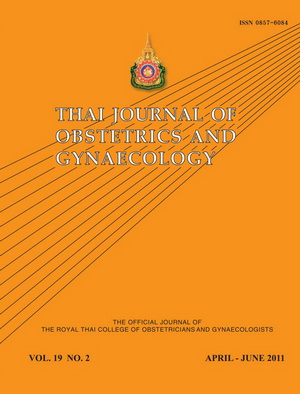Prognostic Factors and Survival Outcome of Uterine Sarcoma Patients: 21 Years Experience at Ramathibodi Hospital
Main Article Content
Abstract
Objectives:
To evaluate the prognostic factors that may affect the survival outcome of patients with uterine sarcoma.
Materials and Methods: In this retrospective study, various clinicopathologic factors and treatment of 58 patients with uterine sarcoma treated between January 1987 and December 2007 at Ramathibodi Hospital were reviewed. Univariated and multivariated logistic regression model were used to evaluate the prognostic factors for statistical significance. The survival was assessed by Kaplan-Meier method and proportional hazards method.
Results: During the study period, 58 uterine sarcoma patients met the inclusion criteria. The median follow up time was 19.8 month. Fifty-three patients had primary surgery and then received adjuvant therapies which were radiation in 21 cases (36.2%) and chemotherapy in 26 cases (44.8%). The 5-year overall survival rate was 46%. The median survival time was 21 months. The overall death rate was 14/1000/month. The univariate analysis showed that residual tumor, age > 50 years, advanced stage undergoing bilateral salpingo – oophorectomy (BSO) and carcinosarcoma were significant with poor survival. Patients who underwent hysterectomy were associated with longer survival time than those who did not (Median survival time (MST) 31.1 vs 7.1 months, p = 0.02). The multivariate analysis showed that residual tumor after surgery and age > 50 years were significantly associated with poor survival. Hysterectomy was significantly associated with good survival.
Conclusion: The overall survival of uterine sarcoma patients was rather short. The unfavorable prognostic factors were residual tumor after surgery and age > 50 years. The favorable prognostic factor was undergoing hysterectomy.


